Titusville deadly force case the latest in string of controversial cases to hit Brevard justice system
The arrest of a Titusville police officer this week, accused of killing a Brevard man, has been greeted with cautious optimism by many in the Black community who long have been calling for more transparency and accountability from law enforcement when it comes to policing their own.
Several shootings and deaths involving police officers and young men of color over the last few years, and a lack of prosecutions, have created a sense among many in Brevard that local families have been unable to get justice when Black men die at the hands of police or while in police custody.
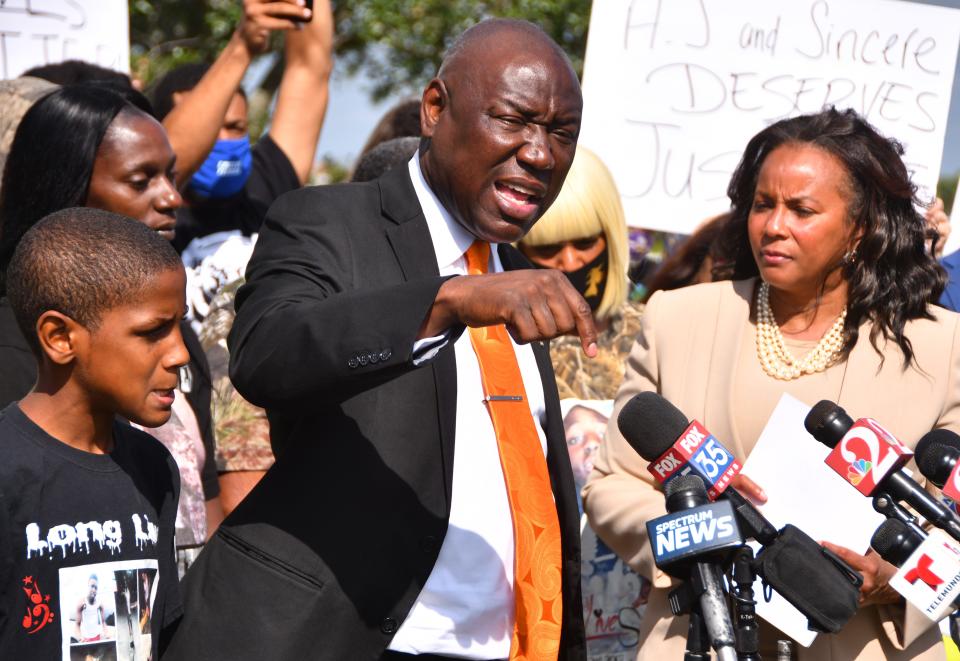
“There is no sense of justice or protocol. All we’ve seen from Brevard is a lack of transparency and a lack of empathy. Many understand that to inspire trust in the community, you need to have transparency,” said Natalie Jackson, an Orlando-based civil attorney involved in a few of the cases.
Officer gets manslaughter charge: Titusville officer arrested in man's shooting death last year during confrontation involving mistaken identity
Mother believes shooting was a case of mistaken identity: Titusville mother waits as state attorney decides if police justifiably fatally shot her son
'We just want to know why': Parents of Florida Tech student killed during confrontation demand answers as students hold vigil
Some of the cases have drawn national attention.
In several cases over the last few years, high-profile attorney Benjamin Crump has come to Brevard, and called for a change in the handling of Brevard's cases involving use of force. Victims' family members, unlike in some other jurisdictions, are not shown bodycam videos or given opportunities for face-to-face encounters with decision-makers.
In each case, the victim's families are asking for more interaction, involvement, and sensitivity early on.
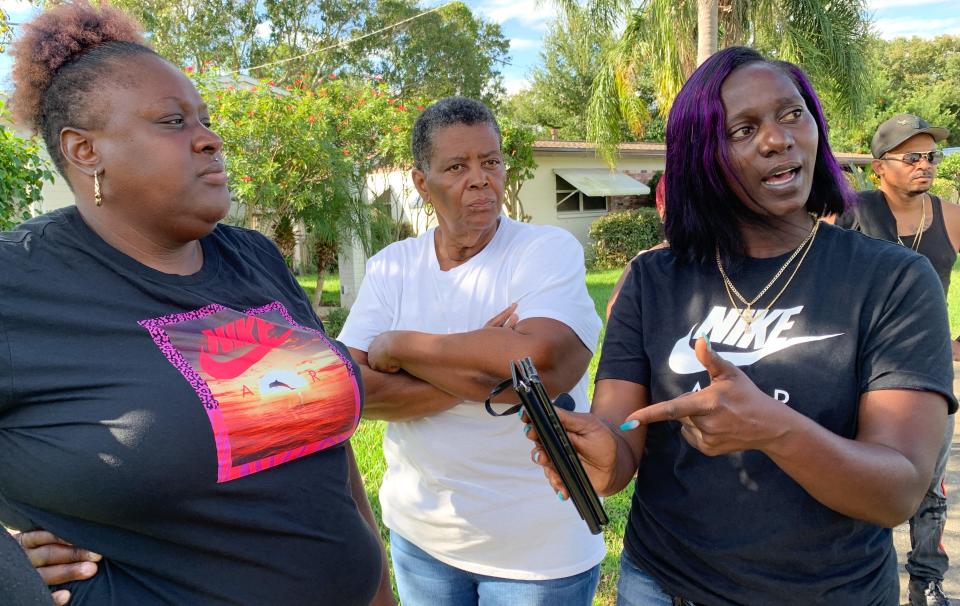
Gregory Edwards
On Dec 9, 2018, Gregory Lloyd Edwards, a 38-year-old former Army combat medic left the Brevard County Jail unconscious and unresponsive after an altercation with as many as nine corrections deputies.
Reports that were kept out of the public view at the time showed that the veteran was punched, kneed, pepper-sprayed and tased him six times before strapping him into a restraint chair with a spit hood over his head, taser darts still in his back and pepper spray still on his face.
Edwards died the next day in a local hospital. Soon after, the Brevard County Sheriff's Office would announce his death from a "medical event' likely caused by what they said they suspected was a history of "huffing" aerosols.
Jail security footage released by the sheriff two years later after FLORIDA TODAY filed a lawsuit for the video, showed Edwards was left alone in the restraint chair without medical attention for nearly 16 minutes and can be seen struggling as if he could not breathe.
The medical examiner's office ruled the manner of death as an "accident" due to "excited delirium" with complications from a hyperactive and violent state with subsequent restraint.'An in-house investigation led the State Attorney Phil Archer to find no need to press charges against the deputies.
In the weeks afterward, the Sheriff's Office changed its policy to no longer allow a restraint chair to be used in combination with a spit hood and pepper spray. No announcement of the change was made but Sheriff Wayne Ivey suggested on radio and television that Edwards and his widow Kathleen were to blame for the tragedy.
Archer found that the Brevard deputies were "completely justified the escalation of use of force techniques to gain control." adding: "I further commend the deputies and the staff at the jail in the actions they took in attending to Mr. Edwards after it became apparent he was in distress.”
His widow, Kathleen Edwards, was initially alone in asking for answers, but was shut out of the sheriff's investigation and not allowed to see the jail security footage because the sheriff said its release could compromise jail security.
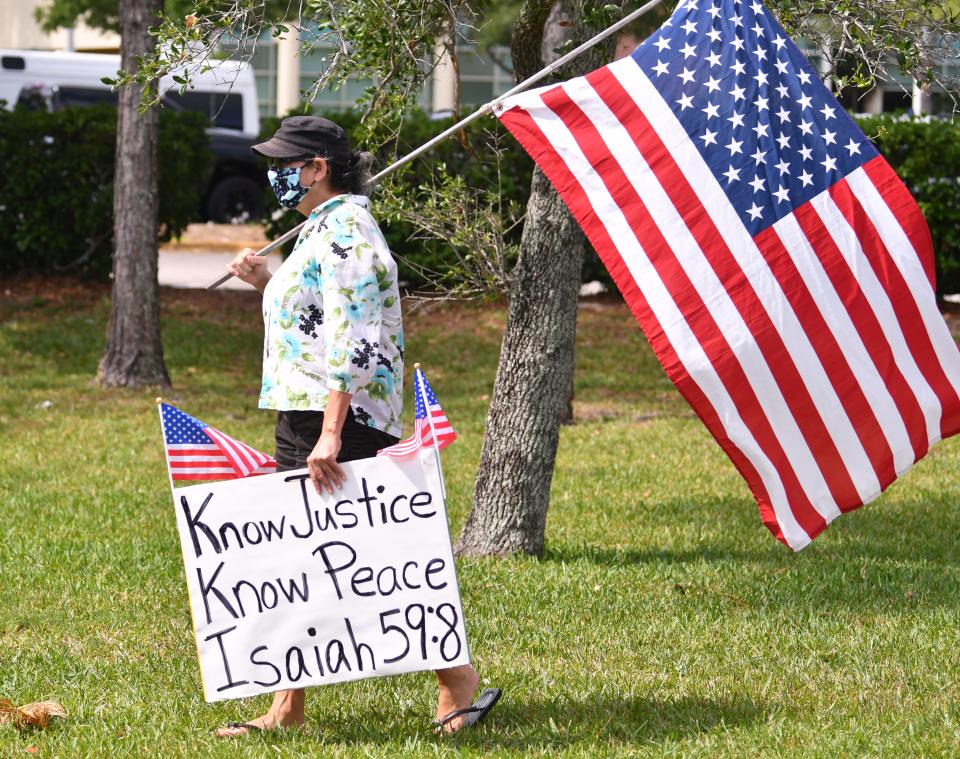
But after the death of George Floyd at police hands in Minneapolis, small protests sprang up in Brevard and grew, with people demanding the release of the jail video and an independent investigation into Edwards' death.
After the jail video was released, Sheriff Ivey continued to defend the actions of his deputies, several of whom were admonished by an unreleased internal affairs investigation for their handling of events in the jail the day Edwards was sent to the hospital.
Kathleen Edwards
Within months, Edward’s widow lost her son — born shortly after her husband’s death — in a June 2020 drowning. The investigating agency was the Brevard County Sheriff’s Office.
Within months of Kathleen Edwards filing a civil suit against the agency, the state attorney’s office moved to file a charge of aggravated manslaughter of a child against Kathleen for the death of her child. The case is still pending.
Archer issued a statement: "The death of a child is a devastating event and carries with it an emotional burden unlike any other. As a society, we understand that sense of loss, but we also charge law enforcement with the duty to determine if any abuse or neglect contributed to the death.
"The decision to prosecute is always difficult, but the evidence in this case overwhelmingly revealed that this tragedy was entirely preventable.”
Angelo Crooms and Sincere Pierce
This case involved the Brevard County Sheriff’s Office and even more protests and calls for accountability and transparency.
On Nov. 13, deputies mistakenly identified a vehicle as stolen as it rode through a Cocoa neighborhood.
'I just don’t believe I’ll get justice': Passion Lucas' family questions Brevard state attorney who dropped DUI manslaughter charge
'We’re still fighting for justice': It's been a 'year of hell' say parents of Cocoa teens killed in mistaken shooting by Brevard deputy
The deputies initiated a traffic stop as the driver, 16-year-old Angelo Crooms, bumping rap music in his girlfriend’s car, pulled into a driveway and then backed out. A dashcam video shows the deputy – gun drawn and centered on the car – opening fire on the vehicle as Crooms slowly drove forward. Deputy Jafet Santiago-Miranda fired nearly a dozen rounds that punched through the car, killing Crooms and 18-year-old Sincere Pierce.
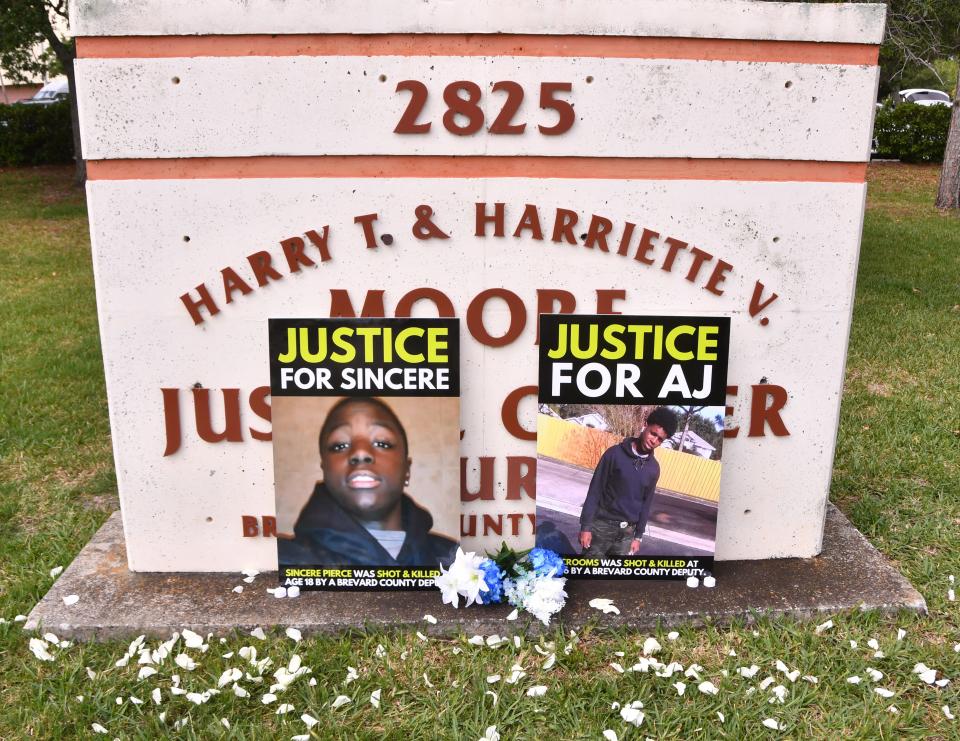
The Sheriff’s Office went four days without publicly acknowledging the shooting or communicating with the parents about the whereabouts of the bodies. The families watched the dashcam videos for the first time on social media and television. Weeks later, several hundred residents marched to State Road 520 and U.S. 1, waving Black Lives Matter signs and calling for an independent investigation. The crowd also surrounded a sheriff’s patrol car and rocked it for several moments.
The parents held press conferences and hired attorney Natalie Jackson to pursue a civil suit. Cynthia Green, the adopted mother of Sincere, spoke publicly that she wanted someone from the Sheriff’s Office or the state attorney’s office to personally call or meet with her about her concerns. The Sheriff’s Office also stepped up an investigation into the third passenger, who survived the shooting, filing several drug-related charges against him.
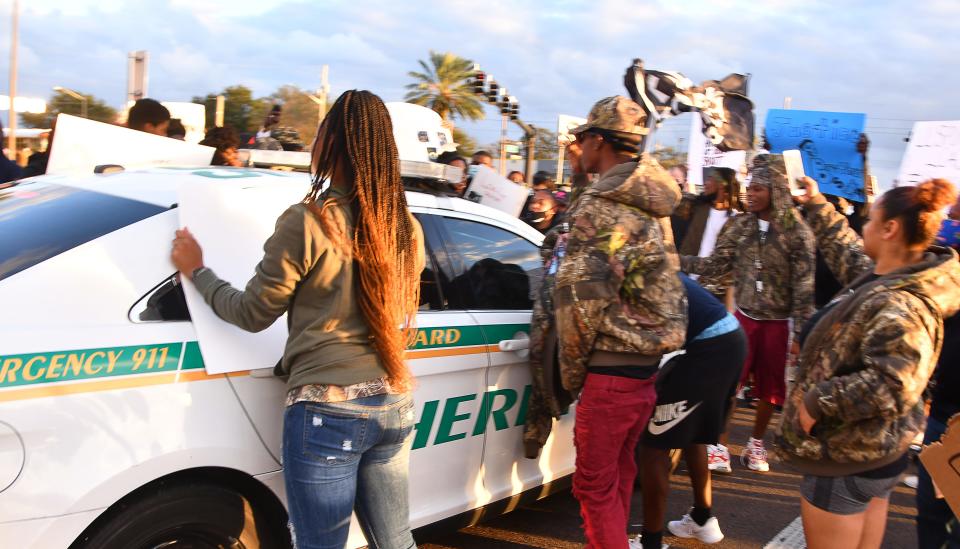
In April 2021, Archer issued a 12-page decision clearing Santiago-Miranda of any criminal wrongdoing in his use of force. While acknowledging that the shooting was a case of mistaken identity, Archer touched on the teens’ contacts with police, the media's reporting of concerns from the parents, efforts by his office to communicate with the attorneys of the families, and called publicly requested area law enforcement academies to review tactics involving shooting into moving vehicles. The deputy involved in the shooting, Santiago-Miranda, later died just short of the shooting anniversary. The death was ruled as natural and the result of underlying cardiac issues.
"Too often you find that the police or the prosecutors don't respect us to even apologize. Do you think Wayne Ivey apologized to us about our sons being killed? No," said Cynthia Green, Pierce's adopted mother.
"Like everyone, we want the prosecutors to do their job, to serve and protect us too. But someone has to be accountable."
Clarence Howard
Although Clarence Howard was shot to death by an off-duty Brevard County sheriff's deputy on Father's Day 2016, the case made it before a jury in May 2021.
The trial lasted four days and former Deputy Yousef Hafza was found not guilty of second-degree murder and attempted second-degree murder in the shooting that killed Howard.
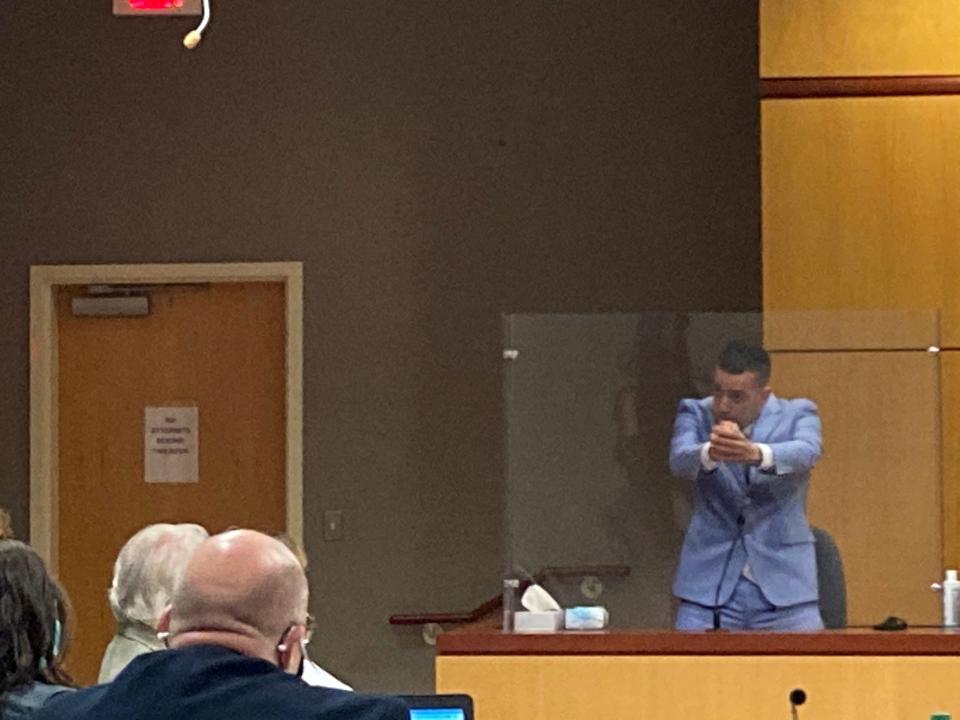
Hafza, who had claimed self-defense, was charged in the case after a Florida Department of Law Enforcement investigation and following protests in Melbourne weeks after the shooting calling for accountability in the case.
Hafza, in recent months, had been working to be reinstated with the Sheriff's Office.
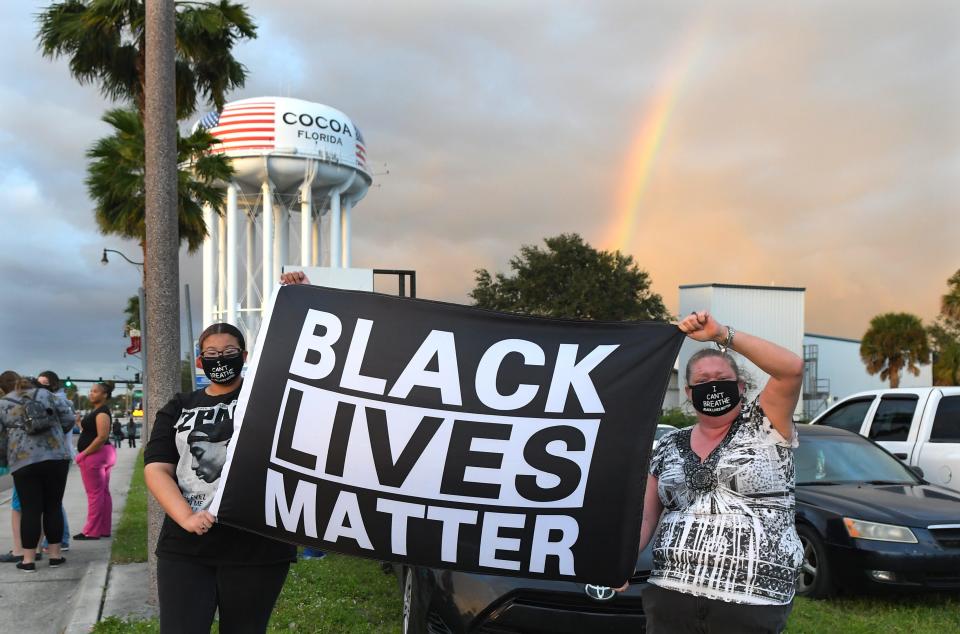
Passion Lucas
In June 2020, a mother of six named Passion Lucas was walking along a darkened Cocoa roadway when she was fatally struck by a vehicle.
The investigation languished for months before Lucas' sister Makita Lucas put her frustrations to social media.
Cocoa police charged the driver with DUI-manslaughter, leaving the scene of a crash involving death and DUI of alcohol or drugs in connection with the death of Passion Lucas, jail records showed.
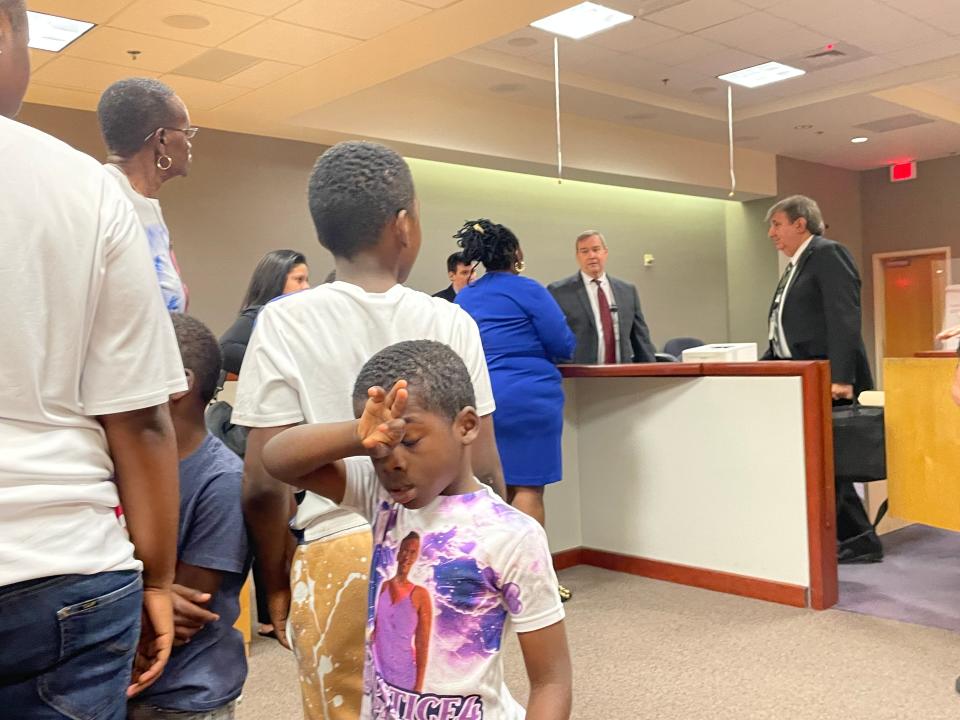
Prosecutors then decided not to charge the driver, who admitted drinking and driving, with manslaughter. Instead she is charged with a second-degree misdemeanor.
The sister raised questions again — after she and her attorney asked for face-to-face meetings with prosecutors — when the state attorney's office decided not to pursue the manslaughter charge. Prosecutors also placed blame on Passion Lucas, following preliminary reports that Lucas was walking in the road, putting herself in harms way.
Brevard judge denies motion: Children, sister of Passion Lucas killed in deadly DUI crash not 'victims'
Sheriff Wayne Ivey: Brevard sheriff appointed by DeSantis to state criminal justice commission
A Brevard County judge, citing the state attorney’s decision not to pursue a manslaughter charge in the case, denied a motion by family members to be considered victims under state law.
“I feel the prosecutor was unsympathetic to what we were facing. They took my sister, who was the victim, who was killed, and treated her like the criminal in this case," said Makita Lucas told FLORIDA TODAY.
On Friday, a Brevard County judge overruled prosecutors in the case and sentenced Suzanna Norris to six months in jail, with three of those in a facility offering mental health treatment.

Alhaji Sow
On Dec. 3., an 18-year-old Florida Institute of Technology student named Alhaji Sow was shot and killed by a five-year veteran of the Melbourne Police Department.
The agency reported that Sow had been acting erratically when he appeared to lunge at the officer with a pair of scissors while in a campus dorm. Melbourne police withheld the officer's name, adding that the officer asked for victim status based on an interpretation of Marsy's law.
The family, who lives in Atlanta, continues to plead for answers nearly six months later. The state attorney's office is reviewing a Florida Department of Law Enforcement report on the shooting and could render a decision within weeks.
J.D. Gallop is a Criminal Justice/Breaking News Reporter at FLORIDA TODAY. Contact Gallop at 321-917-4641 or jgallop@floridatoday.com. Twitter: @JDGallop.
Support local journalism. Subscribe today.
This article originally appeared on Florida Today: Death cases involving police: Families seek transparency, accountability

